 |
Early 1700s
The man works at home, either on his farm or in his shop, which is near or adjacent to his home. He needs his wife and children to work around the house. Daily work can be anything from pulling weeds and feeding chickens to mending socks and spinning wool.
Late 1700s to Early 1800s
The Industrial Revolution is underway. Men are encouraged (often forced) to leave home to work in factories, mines, or other specialized jobs so that he can earn a wage. Because wages are so low, wives and children are often pressed into work to help earn needed income.
Late 1800s to Early 1900s
Public schools are instituted. Children are sent off to school for most of the day. By 1917, education is compulsory in every state for all persons between the ages of 6 and 17.
Mid 1900s
"Second Wave" Feminism fights for labor and "reproductive rights" for women. The image of the career woman becomes a social norm. The woman who typically tended the home by herself was encouraged to have less children and to enter the workforce.
Late 1900s to Today
Rising divorce rates, single parenting, gender confusion, LGBT activism, a struggling economy, and rampant depression all mark an age when the family is a faint and arguable notion. Conservatives claim that LGBT activism hurts families, but the truth is that the family has been steadily declining over the past two centuries because of institutions and laws currently supported by both "Conservatives" and "Liberals."
Some Food for Thought
Those who wish to save "traditional family values" should focus on the general trend which has been progressing for centuries (such as the empty homes created by things we are now required to have) rather than its shallow symptoms (such as "gender identity" crises). I suggest we take a step back, look at how we got to where we are, and re-think our current social climate rather than taking it for granted:
- Would family or gender roles be as ambiguous as they are today if the whole family lived, worked, and learned at home?
- Is there any way we could have raised the "standard of living" without removing the husband from his house?
- Is there any way we could have improved education without institutionalizing and homogenizing it?
- Is there any way we could have assured justice and equity for women without pretending that they are the same as men?
- In what context is it useful to refer to any particular family as a family if its members perform no meaningful activity together?
- Is there any way we could return the family to the home (e.g. is it possible to make work and education family business, rather than corporate or state business)? Would anyone want that?




No comments:
Post a Comment